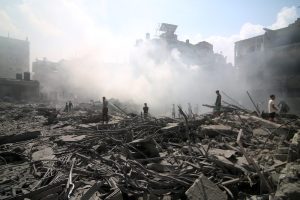
Sarmad Naveed, Canada
Is there a way to sensibly respond to senseless violence?
When the lives of innocent women, children, or the elderly are lost and their homes are destroyed; when mothers are searching for their infant children in the rubble, or infant children searching for their mothers in the rubble, sentiments of enmity for the perpetrators are sure to arise.
But what bearing, if any, should this enmity have on the manner of retaliation?
These days, a predominant question in light of the current situation in the Middle East is, ‘what would a proportionate response be?’
The UN has a ‘Principle of Proportionality’ that prohibits attacks: ‘which may be expected to cause incidental loss of civilian life, injury to civilians, damage to civilian objects, or a combination thereof, which would be excessive in relation to the concrete and direct military advantage anticipated’
This ‘Principle of Proportionality’ certainly isn’t being followed in the war currently raging in the Middle East.
Hamas’ October 7 attack on Israeli people was abhorrent and must absolutely be condemned. Such killings, especially of non-combatants, completely contradicts the true and peaceful teachings of Islam.
On the other side, Israel is retaliating in a manner that has completely and disproportionately tipped the scales, with the number of innocent Palestinian lives lost vastly exceeding the number of Israeli lives lost by the thousands (and counting).
That’s why groups like Amnesty International are calling on Israeli authorities to:
‘Immediately end unlawful attacks and abide by international humanitarian law; including by ensuring they take all feasible precautions to minimize harm to civilians and damage to civilian objects and refraining from direct attacks on civilians and civilian objects, indiscriminate and disproportionate attacks.’
An open letter from North American Rabbis and Cantors reads:
‘At all times, Israel must follow the laws of armed conflict in order to avoid harm to civilians. Hamas’s war crimes do not justify further war crimes or collective punishment…We call for an end to incitement by Israeli politicians and public figures against Palestinian citizens of Israel and Israel human rights organizations. We call on Israel to prevent further revenge attacks by settlers on Palestinians in the West Bank, and to refrain from using the war with Hamas as an excuse to extend settlements and occupation.’
The question remains, how can a proportionate response practically be achieved?
Islam, being a universal religion, presents the beautifully balanced approach that the retaliation to an injury should, at most, be the like thereof, but it would be better to work towards reconciliation.
The Fifth Caliph and Worldwide Head of the Ahmadiyya Muslim Community, His Holiness, Hazrat Mirza Masroor Ahmad (aba) states:
‘Islam teaches that where retribution is required then it must be proportionate to the act of transgression. However, if forgiveness can lead to reformation then the option to forgive should be taken. The true and overarching objectives should always be reformation, reconciliation and the development of long-lasting peace.
However, what in reality is happening today? If anyone commits a wrong or an injustice, then the victim seeks to extract revenge in a way which is completely out of proportion and far greater than the original injustice committed.’[1]
Not only does Islam teach proportionality in such matters, but it also teaches how to avoid disproportionality:
‘Let not a people’s enmity incite you to act otherwise than with justice. Be always just, that is nearer to righteousness.’ (The Holy Qur’an, 5:9)
Justice is the focal point, the centering force to achieving a proportionate response. And what does justice entail? His Holiness (aba) explains:
‘Islam teaches absolute justice and equality in all matters and so we find another very crucial guideline in Chapter 5, Verse 3 of the Holy Qur’an. In this verse it states that to fully comply with the requirements of justice, it is necessary to treat even those people, who go beyond all limits in their hatred and enmity, with fairness and equity.’
Think back to the inception of Islam, a time when Muslims, even the Holy Prophet Muhammad (sa), were persecuted every day, by everyday Makkans. But when the Muslims were given permission by God to take up arms in defence and to protect religious freedom, they didn’t fight or kill the woman who tried to poison him, the children who pelted the Holy Prophet (sa) with stones causing his shoes to fill with blood, or any other person who actively brutalised the Muslims; no, they only fought against the Makkan army. What’s more, when these same people sought forgiveness, it was granted to them.
His Holiness (aba) explains:
‘In early Islam, the conditions were so grave that Allah the Almighty permitted the Muslims to defend themselves to uphold and defend the principle of universal religious freedom. Even then, Islam lay down stringent rules of engagement, wherein any forceful response was to remain proportionate to the cruelty inflicted and every possible opportunity for peace was to be grasped no matter how remote the opportunity.’
That’s what a proportionate response looks like.
His Holiness (aba) states very simply:
‘If a war is warranted, then it can be fought between armies, not with women, children and the innocent.’
This Islamic principle is something which is now, in light of the current prevailing circumstances between Israel and Palestine, being echoed in western media. His Holiness (aba) highlights:
‘Now, some journalists in the west, or even in America have written in their newspapers, that there should be a limit to revenge.’
This is certainly the case, as even renowned publications like The Economist have published headlines such as, ‘Israel needs to resist irrational retaliation’, or NBC News in the USA which published, ‘U.S. officials privately warn Israel to show restraint in retaliating against Hamas’. Quoting Ireland’s Deputy Prime Minister and Foreign Minister Micheál Martin, the BBC published an article titled, ‘Israeli strikes on Gaza “disproportionate” – Martin’.
So, the answer the question of proportionality is a response rooted in justice and preserving innocent lives.
About the Author: Sarmad Naveed is an Imam of the Ahmadiyya Muslim Community who graduated from the Ahmadiyya Institute for Languages and Theology in Canada. He serves as Online Editor and is on the Editorial Board for The Review of Religions, and also coordinates the Facts from Fiction section. He has also appeared as a panelist and host of programmes on Muslim Television Ahmadiyya (MTA) such as ‘Ahmadiyyat: Roots to Branches.’
ENDNOTES
[1] World Crisis and the Pathway to Peace, p. 109




Add Comment